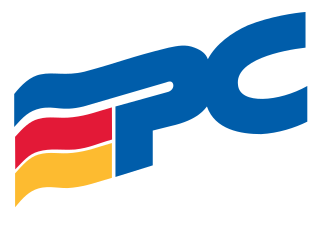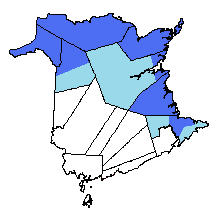This article needs additional citations for verification .(January 2016) (Learn how and when to remove this template message) |


The 27th New Brunswick general election was held on October 26, 1970, to elect 58 members to the 47th New Brunswick Legislative Assembly, the governing house of the province of New Brunswick, Canada. It saw the Liberals defeated, and a new Conservative government take over in the Canadian Province of New Brunswick.

The provinces and territories of Canada are sub-national governments within the geographical areas of Canada under the authority of the Canadian Constitution. In the 1867 Canadian Confederation, three provinces of British North America—New Brunswick, Nova Scotia, and the Province of Canada —were united to form a federated colony, becoming a sovereign nation in the next century. Over its history, Canada's international borders have changed several times, and the country has grown from the original four provinces to the current ten provinces and three territories. Together, the provinces and territories make up the world's second-largest country by area.

New Brunswick is one of four Atlantic provinces on the east coast of Canada. According to the Constitution of Canada, New Brunswick is the only bilingual province. About two thirds of the population declare themselves anglophones and a third francophones. One third of the population describes themselves as bilingual. Atypically for Canada, only about half of the population lives in urban areas, mostly in Greater Moncton, Greater Saint John and the capital Fredericton.

Canada is a country in the northern part of North America. Its ten provinces and three territories extend from the Atlantic to the Pacific and northward into the Arctic Ocean, covering 9.98 million square kilometres, making it the world's second-largest country by total area. Canada's southern border with the United States, stretching some 8,891 kilometres (5,525 mi), is the world's longest bi-national land border. Its capital is Ottawa, and its three largest metropolitan areas are Toronto, Montreal, and Vancouver. As a whole, Canada is sparsely populated, the majority of its land area being dominated by forest and tundra. Consequently, its population is highly urbanized, with over 80 percent of its inhabitants concentrated in large and medium-sized cities, with 70% of citizens residing within 100 kilometres (62 mi) of the southern border. Canada's climate varies widely across its vast area, ranging from arctic weather in the north, to hot summers in the southern regions, with four distinct seasons.
Louis Robichaud, the Liberal premier since 1960, called the election early by surprise. Some analysts believed Robichaud was tiring of the job of Premier, and that he had accomplished everything that he had set out to do, ending with the Official Languages Act in 1969. With no willing leadership candidates ready to take over at the time, Robichaud called an election.
Louis Joseph Robichaud,, popularly known as "Little Louis" or "P'tit-Louis", was the second Acadian Premier of New Brunswick, serving from 1960 to 1970.
He had hoped that the Progressive Conservatives, led by new leader Richard Hatfield, would not be ready for a snap election, but Hatfield released his platform two days before Robichaud did. In fact, the Liberals were forced to write their platform so rapidly they could not get it in by the publishing deadlines for the local newspapers in which they purchased advertising space, forcing them to run blank pages. This gaffe was the major turning point in the campaign.

The Progressive Conservative Party of New Brunswick is a centre-right, conservative political party in the Canadian province of New Brunswick. The party has its origins in the pre-Canadian confederation Conservative Party that opposed the granting of responsible government to the colony. It has historically followed the Red Tory tradition. The Progressive Conservative Party currently leads the provincial government since 2018 under Premier Blaine Higgs.

Richard Bennett Hatfield, was a New Brunswick politician and the longest serving Premier in the province's history (1970–1987).

A newspaper is a periodical publication containing written information about current events and is often typed in black ink with a white or gray background.
Meanwhile, Hatfield grew increasingly confident. He campaigned across the province in a helicopter, and analysts were susprised at the ease in which he communicated in both official languages. Although the Liberals won the popular vote, the Conservatives won a majority of the seats in the provincial legislature.

A helicopter is a type of rotorcraft in which lift and thrust are supplied by rotors. This allows the helicopter to take off and land vertically, to hover, and to fly forward, backward, and laterally. These attributes allow helicopters to be used in congested or isolated areas where fixed-wing aircraft and many forms of VTOL aircraft cannot perform.
This was also the first New Brunswick provincial election contested by the New Democratic Party, though they did not win any seats.
| New Brunswick general election, 1970 | |||
|---|---|---|---|
| Party | Leader | Seats | Pop Vote |
| Progressive Conservative Party of New Brunswick | Richard Hatfield | 32 | 48.4% |
| New Brunswick Liberal Association | Louis Robichaud | 26 | 48.6% |
| New Brunswick New Democratic Party | J. Albert Richardson | 0 | 2.8% |
| Other / Non-Partisan | 0 | 0.2% | |











